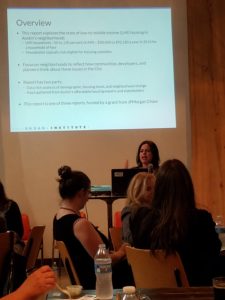
Urban Institute Sociologist Diana Elliott gives an overview of the new report about the state of Low- and middle-income housing in Austin.
It is widely believed that for cities like Austin to overcome their struggles with a lack of affordable housing, it will take the involvement and cooperation of corporations. One major corporation, JP Morgan Chase, has adopted a corporate responsibility agenda that’s focused on helping address major economic and social challenges by expanding economic opportunity and driving more inclusive economic growth. In keeping with that commitment, JP Morgan Chase is funding the Urban Institute (UI) to examine low-to-moderate income housing needs in three rapidly-growing cities, Austin, Miami and Denver.
On October 10, 2017, JP Morgan Chase held an event to observe the release of UI’s report called “Austin and the State of Low- and Middle – Income Housing: Strategies to Preserve Affordability and Opportunities for the Future.” Diana Elliott, a sociologist and senior researcher at the Urban Institute outlined some of the major findings in the report. It found that Austin’s rapid growth, largely due to the influx of tech companies and their affluent employees, has driven up the demand for housing, housing prices and property taxes in the city. This has caused a particular problem for low- and middle-income (LMI) households whose incomes are too high to qualify for subsidies but too low to pay for market-rate housing. The study found that families in Austin who are spending 30 percent or more of their income on housing has more than doubled since 2000.
Urban Institute analyzed data from 2000 to 2015 and identified targeted interventions for neighborhoods facing different challenges that would help LMI households in those areas. This includes reevaluating homestead exemptions to ease property tax burdens, especially for older property owners, more community land trust programs to create affordable housing, and more Homestead Preservation Districts.
The launch event also included a panel discussion moderated by Liza Cowan, an Executive Director with JP Morgan Chase. Panelists included Diana Elliott, Mandy De Mayo, City of Austin Community Development Administrator and former HousingWorks Executive Director, Walter Moreau, Foundation Communities’ Executive Director, Mike Nellis, CEO of Austin Community Foundation and David Danenfelzer, the Development Finance Manager for Texas State Affordable Housing Corporation.
Early in the discussion De Mayo pointed out that although there are some good things happening for affordable housing in Austin, including CodeNEXT, the rewrite of the Land Development Code, none of the current programs or initiatives will provide affordable housing at the scale Austin needs. “CodeNEXT is not going to make us an affordable city. There’s no silver bullet,” said De Mayo. Danenfelzer said it’s vital for Austin to find more ways to ensure that more of the “right type of housing” is built in the city. That includes so-called “missing middle” housing, which LMI families can afford.
The UI report found that the affordability issue in Austin enjoys unusually high participation from residents. Moreau said although he has been involved in about ten “not in my backyard”(NIMBY) conflicts with neighborhood groups over plans to build affordable housing near their homes, he said being very up front with residents and informing them about Foundation Communities’ track record has been an effective way to get neighborhoods on board.
Nellis said philanthropic sources like foundations are a very important part of the solution and that philanthropy needs institutions like community development financial institutions (CDFI’s) because they can move money though with relative efficiency.